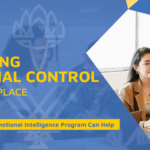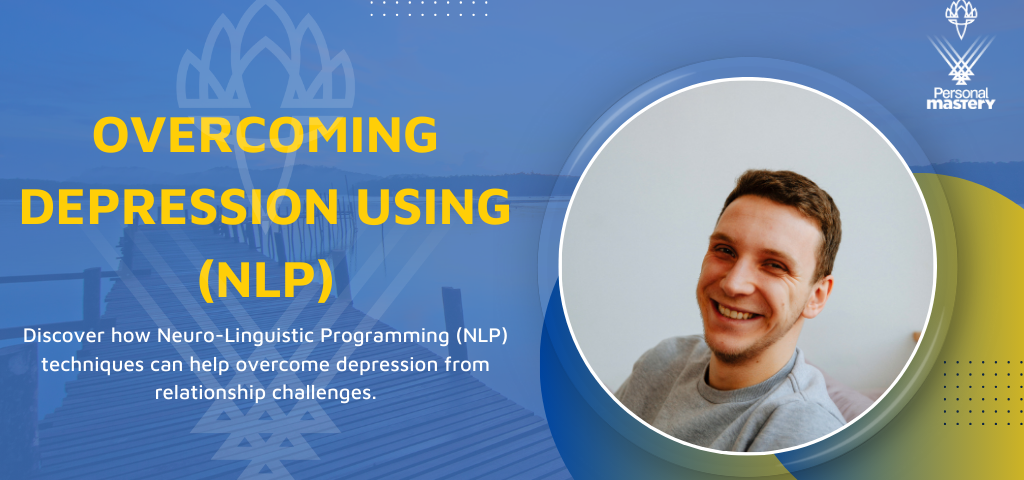
Navigating the Complexities of Modern Mental Health Care
October 14, 2024
Mastering Emotional Control in the Workplace: How Leadership and Emotional Intelligence Program Can Help
October 29, 2024Introduction
While relationships can be enriching, they can also produce anxiety and emotional distress. Depression is often a natural outcome of relationship troubles when they become mental health issues. This need involves traditional therapy or counseling Neuro-Linguistic Programming (NLP) and other alternatives that would aid in solving relationship issues (especially the emotional part behind them) Using Neuro-Linguistic Programming. In this blog post, we will examine the application of NLP Techniques for treating and overcoming relationship-induced depression.
What Is Neuro-Linguistic Programming (NLP)?
Neuro-Linguistic Programming (NLP) is a psychological method that demonstrates how to model excellence, change behavior, and think. The relation between neurological processes, language, and behavior learned through experience. NLP uses many techniques to re-final negative/negative thoughts and feelings so that they can begin coping better with stress, anxiety, and even depression.
How Relationship Issues Contribute to Depression
Before we swim in the NLP sea, let us familiarize ourselves with the basic concept of how relationship problems can bring depression. In cases of unhealthy relationships where the two parties are in constant conflict, criticize each other, and do not give enough space or respect to yourself, many feelings may sprout, such as feeling lost all sorts of hope upon living a restless life. In the Long term, these emotions can compound and if left unchecked could result in a diagnosis of clinical depression.
Using NLP to Overcome Depression from Relationship Issues
Reframing Negative Thoughts
Maybe the most powerful of all NLP tools, reframing requires you to see your very own circumstances differently. In depression due to Relationship Problems, much of the negative self-talk is likely focused on how you are somehow responsible for those problems and/or unworthy/unlovable because they are there in your relationship. NLP helps you become aware of and consequently change these thoughts into positive empowering beliefs. For instance, instead of claiming to yourself that you are not enough to work reframe. I have the potential right now at this spot in life to grow and develop further within this relationship.
Anchoring Positive Emotions
This also brings in the technique of anchoring, wherein favorable emotions are supposedly linked to certain triggers. When a positive emotion is anchored to a stimulus-results from a word, gesture, image, or memory-you can readily get to that emotional stage to help you during stress related to relationships. For example, whenever you feel overwhelmed by an argument, you can use your anchor to recall feelings of calmness or self-confidence.
Understanding and Altering Communication Patterns
Miscommunication is often at the heart of many relationship problems. NLP emphasizes the importance of effective communication. Using NLP techniques, you can learn how to better understand your partner’s communication style and adjust your communication to encourage healthy dialogues. Thus, reducing misunderstandings reduces the emotional entanglement that often exacerbates conflict.
Dissociation Technique for Emotional Detachment
During their involvement in toxic friendships or relations, an individual tends to become emotionally flooded with negative emotions attached to them. NLP uses a dissociation technique that steps one outside the emotional situation and pungently examines the scenario from a third-person perspective. That allows the person to dissociate from their overwhelming feelings and engage in a more logical thought-processing procedure about the situation. This can greatly benefit an individual during the whole healing process about a wider view taken on the matter.
Rebuilding Self-Esteem and Confidence
Relationship problems often tend to take away the self-worth from the psyche of an individual, making him or her either feel inadequate or unworthy of love. Yet, other NLP exercises can help you restore your self-confidence by urging you to take into account the qualities that make you special. As soon as you can promote positive thoughts about yourself, you become less dependent on approval from your partner, which at that time lessens feelings of depression.
Time Line Therapy to Release Emotional Baggage
Time Line Therapy is another powerful NLP technique that, when applied adequately, has the potential to release emotional baggage from past experiences. Most of the time, irrespective of the contemporary moment, depression arising from relationship-related problems is normally tied to unresolved feelings about past relationships. Time Line Therapy, on its end, allows you to go backward to release these negative emotions so that clean emotional starts are possible and further allow you to make progress in negativity.
Why NLP Is Effective for Relationship-Based Depression
NLP Works on the Subconscious Level
What binds NLP to be highly capable of solving this problem is that it stands very close to working directly on the subconscious mind, where many of our negative forms of programming and belief systems lie. Traditional therapy remains essentially engaged on the conscious level of thought processes, whereas NLP deepens itself further into the subconscious programming, thereby making the work of establishing lasting change somewhat easier.
Personalized to Individual Needs
One of the unique aspects of NLP is that it can be highly personalized. Depressing relationship issues affects everybody differently, and NLP techniques will always be unique to your emotional problems. Be it communication breakdown, infidelity, or emotional abuse, NLP provides very particular, personalized modalities.
Short-Term Results with Long-Term Impact
Traditional therapy can take a few months or more to effect change, NLP gets you immediate relief from distress. Some people experience significant emotional shifts after just a few sessions, but techniques learned have a lasting impact on mental health and well-being.
Common Relationship Issues Addressed by NLP
Handling Betrayal and Trust Issues
This issue addresses the kinds of issues that lead to depression in relationships. NLP has been able to help bring trust back into your life, not only in yourself but in others as well, by changing your perception about betrayal and teaching you how to drop resentment.
Overcoming Breakups and Separation
Separation and breakup surely bring a lot of emotional wounds. Techniques provided by NLP do help deal with mourning and pain and therefore allow for quicker healing.
Dealing with Toxic Relationships
While stuck in toxic relationships, NLP can become an alternative salvation. This will help people familiarize themselves with unhealthy patterns, regain command over their emotions, and make empowered decisions, whether to heal or to move on.
Steps to Implement NLP Techniques for Overcoming Depression
Find a Certified NLP Practitioner
While some NLP methods can be self-learned, it would always be better and optimal if guided through by a certified NLP practitioner who can, in effect, help you fully experience the process and craft the mechanisms of curing according to your unique and personal problems.
Practice Mindfulness and Visualization
Incorporating mindfulness and visualization exercises with your general NLP techniques can enhance emotional healing. Picture yourself in a future unencumbered by emotional pain; this will reinforce your commitment to positive change.
Be Consistent and Patient
With any healing process, it takes consistency. The more often you practice NLP exercises, the more you will reinforce the new thought patterns and emotional responses that will lead to tangible improvements in your mental health.
Conclusion
Overcoming depression from relationship issues can be an alarming process, but with the right tools, it’s entirely achievable. Neuro-Linguistic Programming (NLP) provides practical and effective techniques to manage the emotional challenges that come with relationship problems. Whether you’re struggling with trust, communication, or emotional trauma, NLP can help you rewire your thought patterns, regain control of your emotions, and ultimately move toward a healthier, more fulfilling life.
With hard work and practice, individuals can minimize and overcome emotional barriers in relationships. This transformation is essential not only for personal well-being but also for creating healthier, lasting relationships. Whether you’re seeking personal growth or looking to help others as a certified NLP Practitioner, the combination of NLP and life coaching offers powerful tools for success.
By enrolling in our Affiliated NLP Practitioner course, you can make a meaningful impact on the lives of others, helping them to overcome emotional challenges, communicate more effectively, and achieve their goals. The right guidance by Prabhleen Gupta can empower both personal growth and the ability to support others on their journey to emotional healing.
Contact Us
Phone: +91-9592877000
Email Id: support@personalmastery.in
Address: #748, Sector 9, Panchkula (Chandigarh), Haryana (INDIA) – 134113
FAQs
1. What is Neuro-Linguistic Programming (NLP) and how does it help with relationship issues?
Neuro-Linguistic Programming (NLP) is a psychological approach that focuses on understanding and altering behavior, communication and thought patterns. When applied to relationship issues, NLP helps individuals reframe negative thoughts, improve communication, and manage emotional distress by changing how they perceive and respond to challenges, ultimately reducing feelings of depression.
2. Can NLP really help in overcoming depression caused by relationship problems?
Yes, NLP can be highly effective in overcoming depression stemming from relationship problems. By working on the subconscious mind, NLP addresses deeply ingrained emotional patterns, helping individuals develop healthier thought processes, build self-esteem, and manage negative emotions more effectively, all of which can contribute to relieving depression.
3. How quickly can NLP techniques show results for relationship-based depression?
NLP often delivers quick results, with some individuals experiencing significant improvements in their emotional state after just a few sessions. While each person’s journey is unique, the techniques provide practical tools that can offer relief in the short term, while promoting long-term emotional and mental well-being.
4. Can NLP help with healing after a breakup or separation?
Yes, NLP offers specific techniques for managing the emotional pain and grief that come with breakups and separations. Through tools like reframing, anchoring, and Time Line Therapy, NLP helps individuals heal emotionally, let go of past hurts, and move forward with confidence and resilience.
5. Do I need a certified NLP practitioner to use these techniques, or can I practice them on my own?
While some NLP techniques can be self-taught, working with a certified NLP practitioner is recommended, especially for addressing complex emotional issues like depression. A practitioner can provide personalized guidance and ensure that the techniques are applied effectively for your unique needs.


